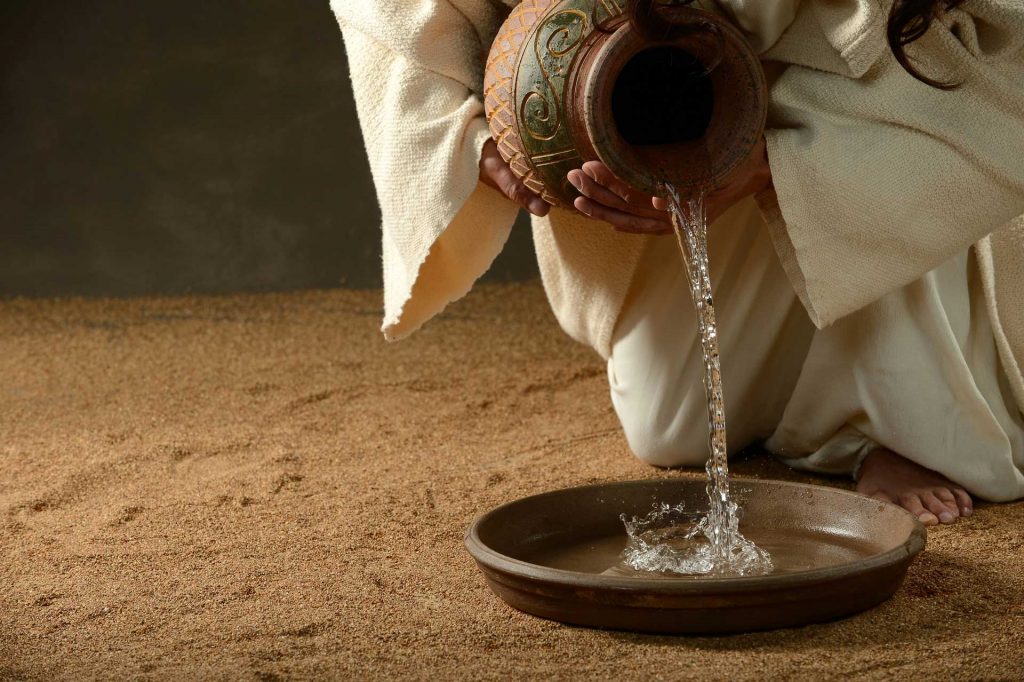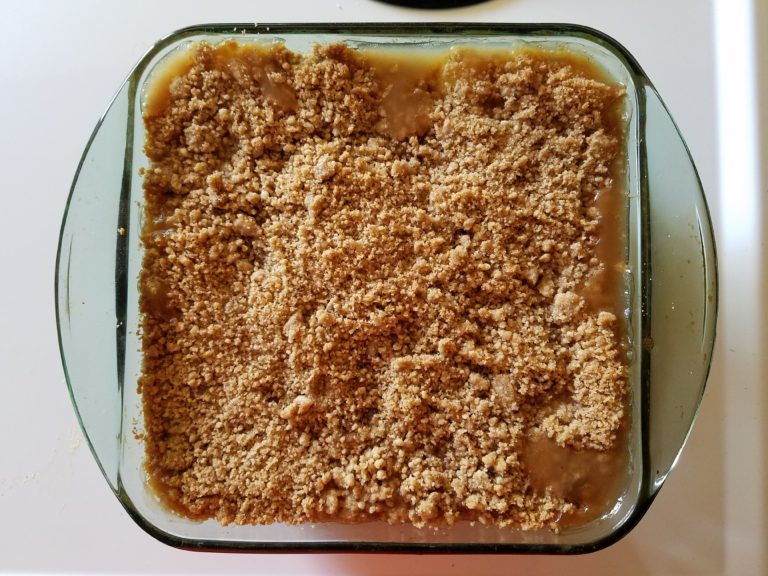Good afternoon and Happy Easter. I’m Eric Isaacson, husband of Katie Isaacson, and father to Kate, Eli, Lily, Sarah, Brigham, Andrew, and Jake ages 20 months to 16 years. We’ve been in the ward for about 12½ years and Katie and I currently serve with the Young Men and Young Women. If you ask Katie or me how things are going, a pretty common answer is “Crazy”. It’s not really a canned response, but it’s often the easiest way to sum up any given timeframe and really, it’s probably the best way to sum up our family in general. Some of the main ingredients in our home are outdoor activities, gymnastics, nerdiness, and adhd. Just stir all of that together and let it simmer and you’ll get quite an adventure that’s easily described as crazy.
To better celebrate the Easter holiday, our family tries to envelope ourselves in the Easter story. We watch the church’s videos and try to incorporate the scriptures surrounding the final days of Christ’s mortal ministry into our daily personal and family scripture study. Our Family Home Evening lesson easily gravitates to the topic. This year, the Gospel Library app even has an Easter study guide that has a different study topic for each day of the week, following closely the events of that holy week. We didn’t make it through the whole week of studies but what we did was very helpful.
As I study what our Savior did, I marvel at the magnificence of what He has done for each of us. I feel the spirit testify of the truthfulness of what Christ has done and gain greater appreciation for His sacrifice. I try to be in His shoes–trying to understand what it must have been like for my elder brother to do what He did. Some of the events of Holy Week are difficult to fully comprehend but the Savior’s love can be seen throughout that week and by engulfing myself in that story, I can draw nearer to him and my ability to follow Him is strengthened.
I’d like to follow some of the main events of the week leading up to Christ’s crucifixion and then share some of the thoughts I’ve had and some lessons I’ve learned.
Timeline
Christ’s final week of mortality began with Palm Sunday as Jesus made His triumphal entry into Jerusalem on a donkey as a multitude of people welcomed him by laying palm leaves in his way.
Monday
On Monday, Jesus cleansed the temple for a second time, casting out merchants who were exploiting people who came to worship at the temple.
Tuesday
On Tuesday, Jesus taught. He taught parables, he taught in the temple, and he taught some inquiring pharisees about the 2 great commandments, first to love God with all your heart, mind, and soul and second, to love your neighbor as yourself.
Thursday
Thursday is known to much of the world as Maundy Thursday. Thursday was a very big day. Jesus shared a passover meal with His apostles in The Upper Room, a meal that would come to be known as The Last Supper. Before dinner, he washed the feet of the apostles. He instituted the sacrament and taught many things, including a new commandment of “As I have loved you, love one another.” It’s that new commandment that earns Thursday the name of Maundy Thursday as Maundy means command. Later, Christ offered what we call the Intercessory Prayer where he prayed for His disciples and all who would believe in Him, asking that they might be one with the Father and the Son, be sanctified, and be filled with love.
Then Jesus and His apostles went to the Mount of Olives to the Garden of Gethsemane. There, he left his apostles and went off to pray alone. It was there in Gethsemane that his great suffering began. Jesus Christ suffered for the sins of the world. He took upon him all of the pain, suffering, sorrow, and sickness that ever was or ever would be among the children of God. Looking ahead to this time, the prophet Alma taught, “… and he will take upon him their infirmities, that his bowels may be filled with mercy, according to the flesh, that he may know according to the flesh how to succor his people according to their infirmities…the Son of God suffereth according to the flesh that he might take upon him the sins of his people, that he might blot out their transgressions according to the power of his deliverance”. Luke tells us that he prayed “Saying, Father, if thou be willing, remove this cup from me: nevertheless not my will, but thine, be done. And there appeared an angel unto him from heaven, strengthening him. And being in an agony he prayed more earnestly: and his sweat was as it were great drops of blood falling down to the ground.”
Jesus Christ suffered all for you and for me, for everyone that ever lived and for everyone who is yet to live. He paid for our sins and redeemed our souls. Because of His suffering, he knows us and understands every sorrow or struggle we will ever have to endure because he felt every bit of it for each of us individually. There is no greater example of love than what our Savior chose to endure for us, beginning in the Garden of Gethsemane.
After enduring this suffering and returning to His apostles to find them asleep for a third time, Jesus awoke them to meet Judas Iscariot and a multitude of armed men that had come for him. Judas betrayed him by kissing him on the cheek. The Apostle Peter then cut off one of the servants’ ears to protect the Savior. Jesus responded by healing the man’s ear and teaching the apostles further about what was going to happen.
Friday
The day known as “Good Friday” started very early, holding court at the home of the Jewish high priest, Caiaphas. After being illegally tried and wrongfully convicted there, he was taken before the Roman Governor, Pontius Pilate. Pilate himself could find no fault with Him and presented Jesus to the people to be released, only to be countered by a cry to “crucify Him”. Then, the Redeemer of all mankind was stripped, scourged, crowned with thorns, and mocked before being taken to a place called Golgatha where he was nailed to a beam and hung on a cross. His suffering and mortal mission finally ended as He gave up the ghost and allowed his body to die. His lifeless body was buried in a borrowed tomb with guards set to keep watch.
Charity
There is a common thread that I see through that entire week. In his teachings, in his actions, and in every breath of his suffering, Jesus Christ taught and showed love. He taught us to love God, love our neighbor, and love ourselves. He prayed that his apostles would be one and be filled with love. He showed the greatest love as he suffered and died for each of us. His teaching about love seemed to culminate at the Last Supper, when he told his disciples: “As I have loved you, love one another”. To better comprehend what he really may have meant, I feel like we need to rewind his story to before his ministry, and even before his birth.
In the Old Testament, Christ was known as Jehovah, the God of Abraham, Isaac, and Jacob. During that time, he witnessed the brutality of the Old Testament. He witnessed the suffering of Job. He was there with the children of Israel in bondage in Egypt and in suffering as they wandered the desert. He saw the Assyrians conquer and scatter the 10 tribes and those of Jerusalem get conquered and carried into Babylon. He had seen the physical and emotional pains of millions who had come to Earth before Him. To some extent, He anguished with all of them through their countless miseries. As if witnessing all of that wasn’t enough, He also knew of all the things to come and knew of the pains of mankind that were yet to be. For the last 3 decades, walking the Earth as Jesus of Nazareth, the concept of pain had become less of a theoretical grief as He had been through a variety of painful experiences during His mortal life even before his final week.
All of this must have weighed on His mind as He made His triumphal entrance into the city of Jerusalem. He was returning to Jerusalem to complete his mortal ministry. Perhaps that’s why he wept when he heard of Lazarus’s death, knowing that raising Lazarus would bring Him back to Jerusalem. As He considered the suffering of the Atonement that must take place in the coming week, there must have been some fear in his heart. He knew He would suffer for all the pains of this world that there ever were or that ever would be. His feeling of anxiety alone is hard to comprehend.
By the time He walked into that upper room on the night before his crucifixion, He had already told His disciples when He would die and had even been anointed in preparation for his impending death. Even with all of this, only He knew what lay ahead, and perhaps not even He could grasp the depth of pain He would have to endure.
In the upper room, Jesus partook of the passover meal with His apostles. One of those twelve of whom He could most rely, left the supper to betray Him. It was in the midst of this meal, that the heavy laden master stood up, changed his clothes, and washed the feet of his apostles as only a servant would. At this hour, Jesus Himself was the one who seemingly needed such a kind and reassuring comfort, yet there is no record that anybody in turn washed the Savior’s feet. For Jesus, it was never about Him.
It was after all of this and after this great selfless act of service that Jesus said these words in John 13:34, “As I have loved you, love one another.”
It’s easy to glance over what I think is the most profound part of that teaching: As I have loved you. I think we all understand that we are to love one another as is clearly taught here. The question is “How did Jesus love His apostles and how did He show that love?” As He said earlier that night, “For I have given unto you an example, that ye should do as I have done to you.”
I’d like to offer four ways that the Savior showed His love:
1. He Gave Service
First, let’s look at what He actually did at the last supper. Dressed as a servant, he washed the disciples’ feet. After His brief explanation, He tells them, “if ye know these things, happy are ye if ye do them.”
When Jesus said “whosoever will lose his life for my sake shall find it”, it encompassed all of His commandments. When we serve others, it doesn’t take very long to find that we have unknowingly served ourselves. Christ gave service as he approached his darkest hours. When I’m feeling down, it’s hard for me to look outside myself and give service. However, it’s not hard for me to find examples of others who seem to blossom under extremely difficult circumstances as they have reached out in service. Our family enjoys the BYUTV show called Random Acts where week after week they spotlight somebody who is improving the lives of those around them, usually after some kind of tragedy has made their own life more difficult. I can think of several people in this ward who seem to embody this well. Happy are ye if ye do this.
2. He Shows an Active Love
The suffering in the Garden of Gethsemane shows the phenomenal and matchless love that Christ has for all of us. His love can also be seen through small acts of kindness, or what Nephi referred to as the tender mercies of the Lord. When Jesus discussed His love with the Apostles in the upper room, He had not yet suffered for them. Thus, there was no one single event to look to but hundreds of smaller things that showed a deep and real love. Likewise, we can show love by our actions, both big and small.
3. He Put Others First
When Christ was in these anxious hours, He yet was thinking of and caring for the Apostles. He gave them comfort, He taught them. He even made it easier for Judas to do what He would do in his early dismissal from dinner. From all accounts, there is little to suggest He even gave a thought about what He must go through until mere minutes before it happened. There was no grieving. There is no record of a downtrodden Redeemer who bemoaned his destiny throughout the night. The mere thought of it seems outrageous. In every aspect, He helped those around Him.
4. His Love Never Faileth
Christ’s anguish certainly didn’t end with the clean feet at the Last Supper and neither did his simple acts of compassion. When He needed peace and comfort, He gave the apostles the reassurance of the Holy Ghost as the Comforter. He told them “Peace I leave with you, my peace I give unto you.” He even tells them, “Let not your heart be troubled, neither let it be afraid”.
In John 16, we read that Jesus continued to give the apostles comfort to an increasing measure. At the end of the chapter, we read “These things I have spoken unto you, that in me ye might have peace. In the world ye shall have tribulation: but be of good cheer; I have overcome the world.”
As he was being arrested, he healed the ear of one of His aggressors. On the cross, he took a minute to make sure his mother would be cared for. He even asked forgiveness for those who carried out his crucifixion.
Conclusion
We refer to this pure love of Christ as Charity. This is what Charity is. Charity is not a happy-go-lucky, sun is always shining, life is perfect principle of the gospel where we love, serve, share, and give once we’ve got everything figured out ourself. Christ gave the commandment to love one another and the example to serve when He was at the door of the furnace looking in. How then can I shrink from my duties when life isn’t going my way? How can I think it is ever okay to treat others poorly because I feel like life hasn’t treated me well? How can I put off helping until my needs are met?
In 1989, Elder Jeffrey R. Holland, then a newly called member of the Seventy shared the following:
“Life has its share of some fear and some failure. Sometimes things fall short, don’t quite measure up. Sometimes in both personal and public life, we are seemingly left without strength to go on. Sometimes people fail us, or economies and circumstance fail us, and life with its hardship and heartache can leave us feeling very alone.
“But when such difficult moments come to us, I testify that there is one thing which will never, ever fail us. One thing alone will stand the test of all time, of all tribulation, all trouble, and all transgression. One thing only never faileth—and that is the pure love of Christ.”
I know that Jesus Christ lives. I know he loves me and I know He loves each and every one of us. I know that as we strive to show love to others as He did, we can experience the true joy that he has promised, the true joy that comes from the pure love of Christ.

















